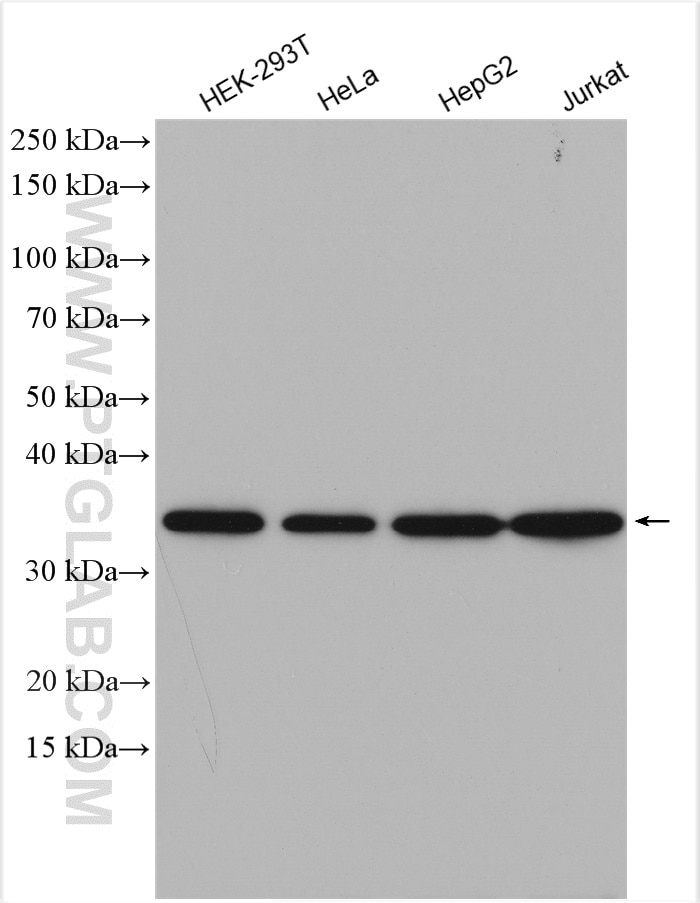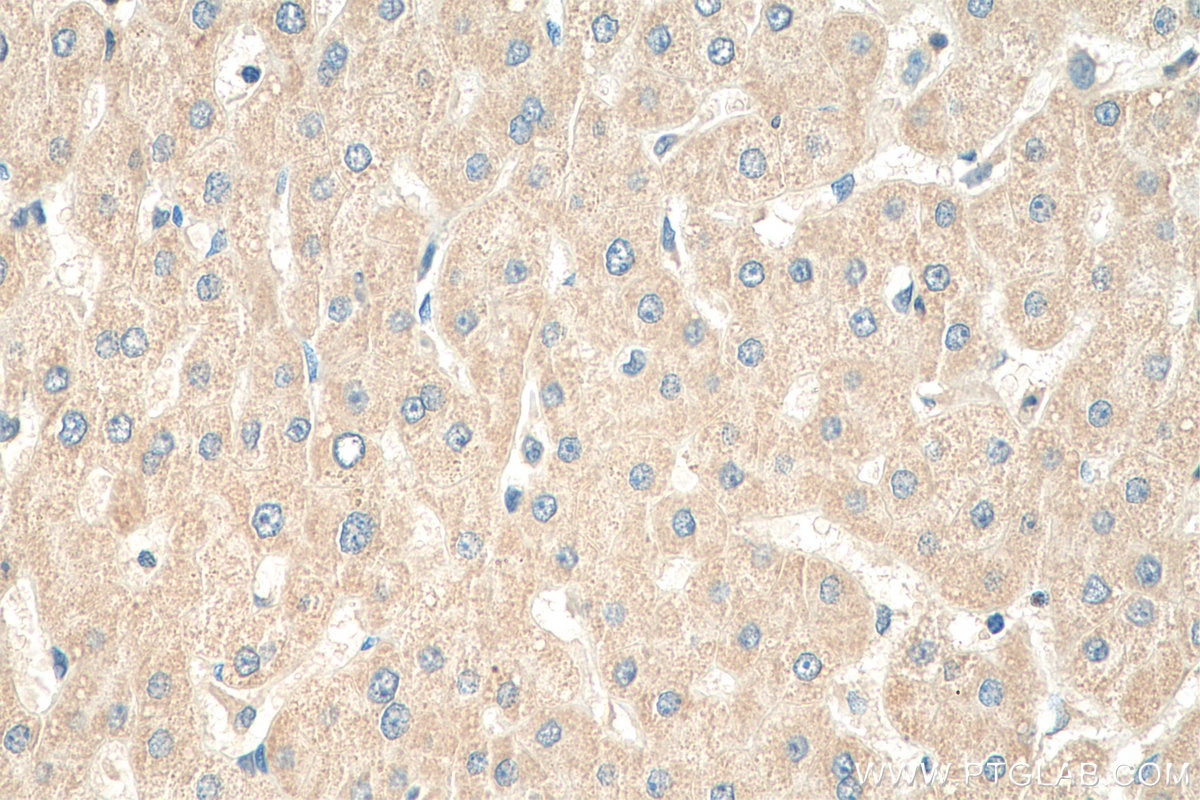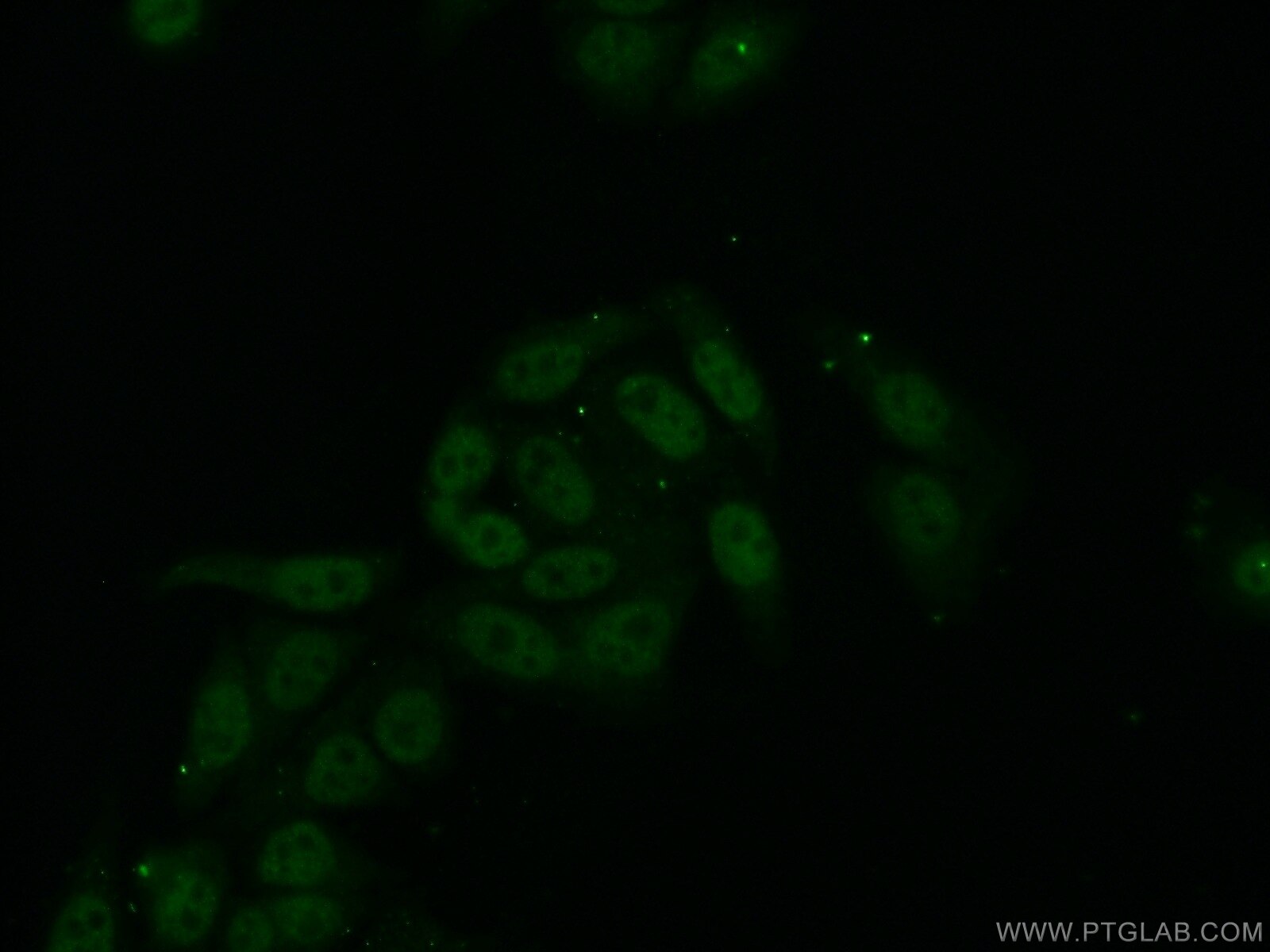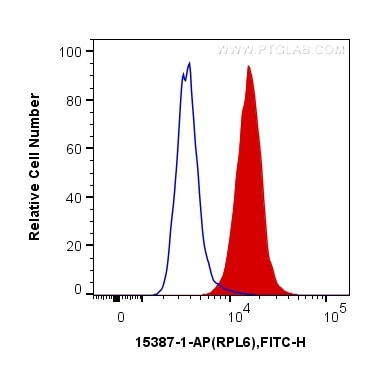Validation Data Gallery
Tested Applications
| Positive WB detected in | HEK-293T cells, HeLa cells, HepG2 cells, Jurkat cells |
| Positive IHC detected in | human liver tissue Note: suggested antigen retrieval with TE buffer pH 9.0; (*) Alternatively, antigen retrieval may be performed with citrate buffer pH 6.0 |
| Positive IF/ICC detected in | HepG2 cells |
| Positive FC (Intra) detected in | HepG2 cells |
Recommended dilution
| Application | Dilution |
|---|---|
| Western Blot (WB) | WB : 1:2000-1:10000 |
| Immunohistochemistry (IHC) | IHC : 1:50-1:500 |
| Immunofluorescence (IF)/ICC | IF/ICC : 1:50-1:500 |
| Flow Cytometry (FC) (INTRA) | FC (INTRA) : 0.20 ug per 10^6 cells in a 100 µl suspension |
| It is recommended that this reagent should be titrated in each testing system to obtain optimal results. | |
| Sample-dependent, Check data in validation data gallery. | |
Published Applications
| KD/KO | See 1 publications below |
| WB | See 7 publications below |
| IHC | See 1 publications below |
| IF | See 3 publications below |
Product Information
15387-1-AP targets RPL6 in WB, IHC, IF/ICC, FC (Intra), ELISA applications and shows reactivity with human, mouse, rat samples.
| Tested Reactivity | human, mouse, rat |
| Cited Reactivity | human, mouse, rat |
| Host / Isotype | Rabbit / IgG |
| Class | Polyclonal |
| Type | Antibody |
| Immunogen |
CatNo: Ag6840 Product name: Recombinant human RPL6 protein Source: e coli.-derived, PET28a Tag: 6*His Domain: 1-288 aa of BC004138 Sequence: MAGEKVEKPDTKEKKPEAKKVDAGGKVKKGNLKAKKPKKGKPHCSRNPVLVRGIGRYSRSAMYSRKAMYKRKYSAAKSKVEKKKKEKVLATVTKPVGGDKNGGTRVVKLRKMPRYYPTEDVPRKLLSHGKKPFSQHVRKLRASITPGTILIILTGRHRGKRVVFLKQLASGLLLVTGPLVLNRVPLRRTHQKFVIATSTKIDISNVKIPKHLTDAYFKKKKLRKPRHQEGEIFDTEKEKYEITEQRKIDQKAVDSQILPKIKAIPQLQGYLRSVFALTNGIYPHKLVF 相同性解析による交差性が予測される生物種 |
| Full Name | ribosomal protein L6 |
| Calculated molecular weight | 33 kDa |
| Observed molecular weight | 34 kDa |
| GenBank accession number | BC004138 |
| Gene Symbol | RPL6 |
| Gene ID (NCBI) | 6128 |
| RRID | AB_2182042 |
| Conjugate | Unconjugated |
| Form | |
| Form | Liquid |
| Purification Method | Antigen affinity purification |
| UNIPROT ID | Q02878 |
| Storage Buffer | PBS with 0.02% sodium azide and 50% glycerol{{ptg:BufferTemp}}7.3 |
| Storage Conditions | Store at -20°C. Stable for one year after shipment. Aliquoting is unnecessary for -20oC storage. |
Background Information
Ribosomes are large multiple protein complexes which is composed of more than 80 components and provide a protein-synthesizing machinery for all living cells. Ribosomal protein like 6 (RPL6, also called Taxreb107 for Tax responsive element binding protein 107), one of the ribosomal components, can bind with the Tax responsive element of human T cell leukemia virus (HTLV)-I in addition to be assembled to ribosomes [PMID:12031506]. Overexpressed in gastric cancer could promote cell growth and cell cycle progression at least through upregulating cyclin E expression[PMID:20171175].
Protocols
| Product Specific Protocols | |
|---|---|
| FC protocol for RPL6 antibody 15387-1-AP | Download protocol |
| IF protocol for RPL6 antibody 15387-1-AP | Download protocol |
| IHC protocol for RPL6 antibody 15387-1-AP | Download protocol |
| WB protocol for RPL6 antibody 15387-1-AP | Download protocol |
| Standard Protocols | |
|---|---|
| Click here to view our Standard Protocols |
Publications
| Species | Application | Title |
|---|---|---|
Cell Res Pre-ribosomal RNA reorganizes DNA damage repair factors in nucleus during meiotic prophase and DNA damage response. | ||
Transl Res Ribosomal proteins as distinct "passengers" of microvesicles: new semantics in myeloma and mesenchymal stem cells' communication. | ||
Mol Cell Proteomics Proteomic landscape of exosomes reveals the functional contributions of CD151 in triple-negative breast cancer. | ||
Nucleic Acids Res ADAR3 modulates neuronal differentiation and regulates mRNA stability and translation | ||
J Cell Biol Identification of coilin interactors reveals coordinated control of Cajal body number and structure
|




